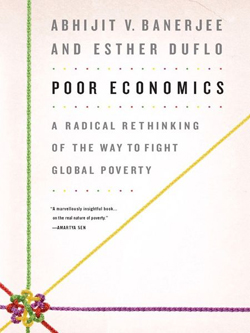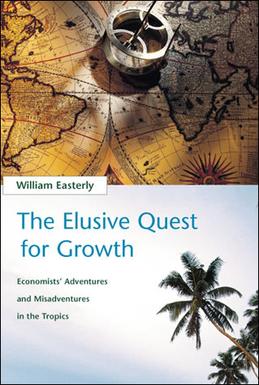Related Research Articles

Michael Robert Kremer is an American development economist currently serving as University Professor in Economics at the University of Chicago and Director of the Development Innovation Lab at the Becker Friedman Institute for Research in Economics. Kremer formerly served as the Gates Professor of Developing Societies at Harvard University, a role he held from 2003 to 2020. In 2019, Kremer was jointly awarded the Nobel Memorial Prize in Economic Sciences, together with Esther Duflo and Abhijit Banerjee, "for their experimental approach to alleviating global poverty."

Mildred Robbins Leet was an American entrepreneur and philanthropist. She was a co-founder and Chair Emerita of the Board of Directors of Trickle Up, a New York–based international non-governmental organization dedicated to alleviating poverty.

Esther Duflo, FBA is a French-American economist currently serving as the Abdul Latif Jameel Professor of Poverty Alleviation and Development Economics at the Massachusetts Institute of Technology (MIT). In 2019, she was jointly awarded the Nobel Memorial Prize in Economic Sciences alongside Abhijit Banerjee and Michael Kremer "for their experimental approach to alleviating global poverty".

Abhijit Vinayak Banerjee is an Indian-born American economist who is currently the Ford Foundation International Professor of Economics at the Massachusetts Institute of Technology. He is co-founder and co-director of the Abdul Latif Jameel Poverty Action Lab (J-PAL), an MIT based global research center promoting the use of scientific evidence to inform poverty alleviation strategies. In 2019, Banerjee shared the Nobel Memorial Prize in Economic Sciences with Esther Duflo and Michael Kremer, "for their experimental approach to alleviating global poverty." He and Esther Duflo are married, and became the sixth married couple to jointly win a Nobel or Nobel Memorial Prize.
Innovations for Poverty Action (IPA) is an American non-profit research and policy organization founded in 2002 by economist Dean Karlan. Since its foundation, IPA has worked with over 400 leading academics to conduct over 900 evaluations in 52 countries. The organization also manages the Poverty Probability Index.

Seva Mandir is an Indian grassroot NGO based in Udaipur, in Rajasthan state, founded by Dr. Mohan Sinha Mehta in 1968. Seva Mandir works mainly in natural resource development and sustainability, village development, women empowerment, education and health care, continuing education, and children's welfare.

The Abdul Latif Jameel Poverty Action Lab (J-PAL) is a global research center based at the Massachusetts Institute of Technology aimed to reducing poverty by ensuring that policy is informed by rigorous, scientific evidence. J-PAL funds, provides technical support to, and disseminates the results of randomized controlled trials evaluating the efficacy of social interventions in health, education, agriculture, and a range of other fields. As of 2020, the J-PAL network consisted of 500 researchers and 400 staff, and the organization's programs had impacted over 400 million people globally. The organization has regional offices in seven countries around the world, and is headquartered near the Massachusetts Institute of Technology in Cambridge, Massachusetts.

Dean Karlan is an American development economist and social entrepreneur currently serving as chief economist of the United States Agency for International Development. Alongside his role at USAID, he is the Frederic Esser Nemmers Distinguished Professor of Economics and Finance at Northwestern University where, alongside Christopher Udry, he co-directs the Globe Poverty Research Lab at the Kellogg School of Management.

Rachel Glennerster is a British economist. She is an Associate Professor of Economics at the University of Chicago. She has been announced as the new president for the Center for Global Development, starting in September 2024.

Joe Madiath is an Indian social entrepreneur. He is the founder and former executive director of Gram Vikas, a non-governmental organisation based in Odisha, India. Gram Vikas uses common concerns for water and sanitation to unite and empower rural communities, including adivasi communities.

Poor Economics: A Radical Rethinking of the Way to Fight Global Poverty (2011) is a non-fiction book by Abhijit V. Banerjee and Esther Duflo, both professors of Economics at Massachusetts Institute of Technology (MIT) and Nobel Memorial Prize in Economic Sciences laureates. The book reports on the effectiveness of solutions to global poverty using an evidence-based randomized control trial approach. It won the 2011 Financial Times and Goldman Sachs Business Book of the Year Award.

The Elusive Quest For Growth: Economists’ Adventures and Misadventures in the Tropics is a 2001 book by World Bank development economist William Easterly. Upon its release, the book received acclaim from such figures as Bruce Bartlett, Robert Solow, and Paul Romer, and has since become widely cited in the Economic Development literature.
The National Rural Livelihood Mission (NRLM) is a poverty alleviation project implemented by the Ministry of Rural Development, a branch of the Government of India. This plan is focused on promoting self-employment and the organization of rural poor. The idea behind this program is to organize the poor into Self Help Groups (SHGs) and make them capable of self-employment. In 1999, after restructuring the Integrated Rural Development Programme (IRDP), the Ministry of Rural Development (MoRD) launched Swarnajayanti Grameen Swarojgar Yojana (SGSY) to focus on promoting self-employment among the rural poor. SGSY is now remodelled to form NRLM, thereby plugging the shortfalls of the SGSY programme. This program was launched in 2011 with a budget of $5.1 billion and is one of the flagship programs of the Ministry of Rural Development. This is one of the world's most prominent initiatives to improve the livelihood of the poor. This program is supported by the World Bank with a credit of $1 Billion. The program was succeeded by Deen Dayal Antyodaya Yojana on 25 September 2015.
The Challenging the Frontiers of Poverty Reduction: Targeting the Ultra Poor (CFPR-TUP) project was initiated by BRAC, a Bangladesh-based development organisation in 2002. The ultra poor are a group of people who eat below 80% of their energy requirements despite spending at least 80% of income on food. In Bangladesh, they constitute the poorest 17.5 percent of the population. These people suffer from chronic hunger and malnutrition, have inadequate shelter, are more prone to disease, deprived of education and more vulnerable to recurring natural disasters. The CFPR-TUP programme is aimed at households which are too poor to access the benefits from development interventions such as microfinance and assists them to access mainstream development services. As of 2015, the program cost around US$35 million a year.

BOMA is a U.S. nonprofit organization and Kenyan NGO that works to provide poor women living in the arid and semi-arid lands of Northern Kenya with the educational, financial, and technological resources to lift themselves out of poverty. Its mission is to “empower women in the drylands of Africa to establish sustainable livelihoods, build resilient families, graduate from extreme poverty and catalyze change in their rural communities.”
The/Nudge Institute, formerly The/Nudge Foundation, is an Indian non-profit action institute established in 2015 with the aim to contribute to "a poverty-free India."

Good Economics for Hard Times: Better Answers to Our Biggest Problems is a 2019 nonfiction book by Abhijit V. Banerjee and Esther Duflo, both professors of economics at MIT. It was published on November 12, 2019 by PublicAffairs (US), Juggernaut Books (India), and Allen Lane (UK). The book draws from recent developments in economics research to argue solutions to the issues facing modern economies and societies around the world, including slowing economic growth, immigration, income inequality, climate change, globalization and technological unemployment. It is their second collaborative book since the publication of their book Poor Economics: A Radical Rethinking of the Way to Fight Global Poverty (2011) and their first since becoming a married couple in 2015. The book's publication comes a month after Banerjee and Duflo were jointly awarded the Nobel Prize in Economics, shared with Harvard University professor Michael Kremer.

The United Nations Framework Convention on Climate Change (UNFCCC), the Paris Agreement, the Sustainable Development Goals (SDGs), and the United Nations Convention on the Rights of Persons with Disabilities (CRPD) are connected through their common goals of addressing global challenges and promoting sustainable development through policies and international cooperation.
The 2019 Nobel Memorial Prize in Economic Sciences was awarded jointly to the economist couple Abhijit Banerjee, Esther Duflo-Banerjee and their colleague Michael Kremer "for their experimental approach to alleviating global poverty". Banerjee and Duflo are the sixth married couple to jointly win a Nobel Prize. The press release of the Royal Swedish Academy of Sciences noted:
"The research conducted by this year's Laureates has considerably improved our ability to fight global poverty. In just two decades, their new experiment-based approach has transformed development economics, which is now a flourishing field of research. They have laid the foundations of the best way to design measures that reduce global poverty"
Emily Louise Breza is an American development economist currently serving as the Frederic E. Abbe Professor of Economics at Harvard University. She is a board member at the Abdul Latif Jameel Poverty Action Lab, and an affiliated researcher at the International Growth Centre and National Bureau of Economic Research. Breza's primary research interests are in development economics, in particular the interplay between social networks and household finance. She is the recipient of a Sloan Research Fellowship.
References
- ↑ "For a world free from extreme poverty". Trickle Up. Retrieved 2024-05-14.
- ↑ "Helping the Poor to Create Successful, Life-Changing Businesses | Tufts Now". now.tufts.edu. 2021-07-14. Retrieved 2024-01-17.
- ↑ Kristof, Nicholas (2019-05-29). "Opinion | Cash, Food and Health Care All Help the Poor, but Something's Still Missing". The New York Times. ISSN 0362-4331 . Retrieved 2024-05-14.
- ↑ "Partnerships". Trickle Up. Retrieved 2024-05-14.
- ↑ Banerjee, Abhijit; Duflo, Esther; Goldberg, Nathanael; Karlan, Dean; Osei, Robert; Parienté, William; Shapiro, Jeremy; Thuysbaert, Bram; Udry, Christopher (2015-05-15). "A multifaceted program causes lasting progress for the very poor: Evidence from six countries". Science. 348 (6236). doi:10.1126/science.1260799. ISSN 0036-8075.
- ↑ Lecture 3: Poverty Traps: Graduation Programs . Retrieved 2024-05-14– via www.youtube.com.
- ↑ "The Impact of a Graduation Program on Livelihoods in Refugee and Host Communities in Uganda | IPA". poverty-action.org. Retrieved 2024-05-14.
- ↑ "Call for Nominations: InterAction 2022 Disability Inclusion Award". InterAction. Retrieved 2024-01-17.
- ↑ "List of non-governmental organizations in consultative status with the Economic and Social Council as of 1 September 2014" (PDF). United Nations - Economic and Social Council. 2014-12-03. Archived from the original (PDF) on 2019-08-27.